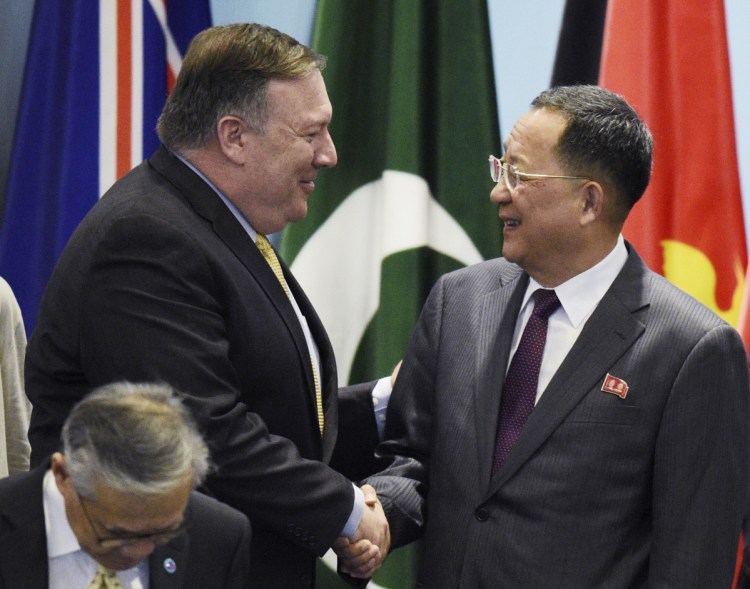JAKARTA, Indonesia — Diplomats from the United States and North Korea alternately shook hands and lobbed critiques at one another Saturday, in what appeared to be another roadblock in the path to negotiations aimed at ending Pyongyang’s nuclear and missile programs.
In a day of head-snapping twists of tone at the annual conference of the Association of Southeast Asian Nations, or ASEAN, in Singapore, Secretary of State Mike Pompeo warned Russia not to help North Korea cheat on U.N. sanctions that Moscow had voted for.
Then, just a few short hours later, Pompeo and North Korean Foreign Minister Ri Yong Ho approached each other for a public handshake and exchanged promising pleasantries with big smiles. According to State Department spokeswoman Heather Nauert, Pompeo suggested they would talk soon, and Ri agreed, adding, “There are many productive conversations to be had.”
Nauert said that beyond the brief exchange at the group photo, Pompeo and Ri did not have a formal meeting. Given where the United States and North Korea were a year ago, Nauert said, “This is a step in the right direction.”
As the two top diplomats returned to their seats, Sung Kim, the U.S. ambassador to the Philippines, approached Ri and handed him a white envelope bearing a letter from President Trump to North Korean leader Kim Jong Un.
While the full contents were unknown, Pompeo tweeted later Saturday that the letter was Trump’s reply to a missive the president received from Kim last week, which White House spokeswoman Sarah Huckabee Saunders characterized as a “follow-up” to their June summit in Singapore. In his own tweet, Trump described Kim’s letter as “nice,” breezily adding, “I look forward to seeing you soon!”
But things at the Singapore conference went downhill after Pompeo departed for Indonesia: Ri waited until then to deliver a sharp attack on the U.S. in remarks at the forum.
Though he said the North Korean government remains committed to a joint statement that followed a summit between Trump and Kim in June, Ri criticized the White House for insisting on maintaining sanctions until disarmament is complete and demanded “confidence-building” measures along the way.
“What is alarming, however, is the insistent moves manifested within the U.S. to go back to the old; far from its leader’s intention,” Ri said.
The divergent rhetoric underscored the difficulties that have hampered previous attempts to persuade North Korea to abandon its nuclear and missile programs. It also was reminiscent of Pompeo’s last visit to North Korea in July, when he declared the meetings “productive”; hours later, North Korea described the U.S. approach as “gangsterlike.”
Previous negotiators have seen similar rapid-fire mood swings from Pyongyang. This is just North Korea’s style of negotiating and indicates any talks would probably take many months, if not years.
Pompeo has acknowledged talks will be difficult and strung-out, but he said Saturday that he remains optimistic that eventually the two sides can reach a deal to end the North’s nuclear weapons program.
Pyongyang’s willingness to truly denuclearize has come into question lately. A confidential report by the United Nations, shown to reporters on Friday, says North Korea has violated numerous U.N. Security Council sanctions by continuing to develop its nuclear weapons and missile programs. Also last week came news reports that intelligence agencies believe the North is developing new missiles.
Much of the discord stems from differences in how Washington and Pyongyang view the pace of rewards to North Korea if it proceeds dismantling its weapons programs. Pompeo has insisted that the U.S. expects total denuclearization and that sanctions will remain in place until the process is complete. North Korea, officially named the Democratic People’s Republic of Korea, has demanded a phased approach, with sanctions eased in several steps as a show of goodwill.
“Confidence is not a sentiment to be cultivated overnight,” Ri said after Pompeo’s departure. “In order to build full confidence between the DPRK and the U.S., it is essential for both sides to take simultaneous actions and phased steps to do what is possible one after another.”
Copy the Story LinkSend questions/comments to the editors.



Success. Please wait for the page to reload. If the page does not reload within 5 seconds, please refresh the page.
Enter your email and password to access comments.
Hi, to comment on stories you must . This profile is in addition to your subscription and website login.
Already have a commenting profile? .
Invalid username/password.
Please check your email to confirm and complete your registration.
Only subscribers are eligible to post comments. Please subscribe or login first for digital access. Here’s why.
Use the form below to reset your password. When you've submitted your account email, we will send an email with a reset code.